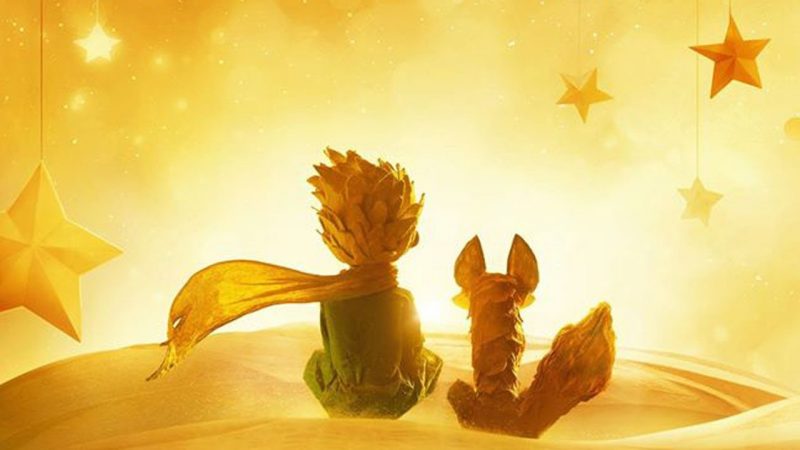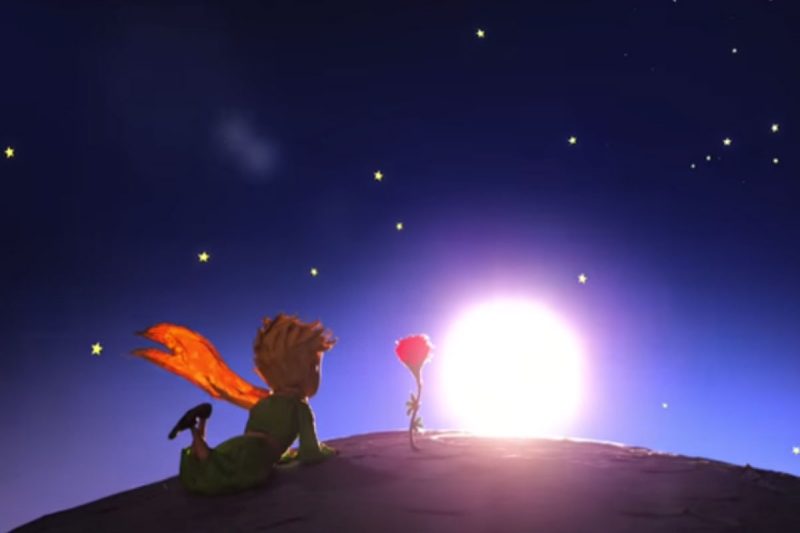The Little Prince Review
"An examination into the pathway to adulthood"

The symbolic emergence into adulthood from the world of adolescence is not to be an extraneous affair. We often forget that. Too much emphasis is placed upon the act of “growing up,” in which it becomes a euphemism for molding into a socially acceptable creature; rather than focusing on the term’s actual intent – that is to remember one's past (not to forget it) and set a higher bar within an evolutionary tract. The expectations as one assimilates into the synchronous society adds tremendous difficulty in devoting time to exploring both the best gift within our existence – to be asynchronous.
The Little Prince, an animated film directed by Mark Osborne (
Kung Fu Panda) which is derived from the 1943 French children’s novel by Antoine de Saint-Exupéry, moves against this grain. It reminds us all about the most simple of things, which are often the most difficult to hold on to. While the totality of the film is unable to catch up to the complexity of its sub-parts, the ingenuity within its development and the beauty of its mixture of paper-mache and animated cinematic sequences break new ground within the cinematic world.

The film follows along with a Little Girl (Mackenzie Foy) who making her first turn into the lane of adulthood by interviewing at a premier private school. The Little Girl is accompanied by her Mother (Rachel McAdams) along this journey. The Mother primarily is driving her Little Girl along this set pathway; however, she is only providing what any good mother would do for her child. She wants to give her the best opportunity to succeed in this harsh world. That’s what the Little Girl wants as well – or so she thought.
The Little Girl’s world is too familiar – she is raised by a single parent and left alone during the day. She isn’t left completely un-monitored as her daily schedules are predetermined by a regimented program designed to propel her into the world of adulthood. She becomes distracted one day – as the mind of most little girls should do – by the antics of her elderly neighbor (Jeff Bridges), who obviously did not get the memo on how to behave as an adult. His house appears oddly different from the rest and while it is less well kept, it is under-toned with a much rooted sense of character. His world is riddled with trinkets (he admits to being a hoarder) and he even houses a semi-functional plane in his backyard! For anyone, the introduction into this unorganized existence would be overly stimulating; however, for a Little Girl who was unaware of the existence of alternative pathways to travel in life, the interactions spark an entirely new dimension within her thinking.
The elderly man invites her into the world of the Little Prince (Riley Osborne at the young version and Paul Rudd as an adult) – a semi-autobiographical work that is set when he was a young Aviator who befriended a Little Prince during one of his travels to a foreign world. The Little Prince’s world is much like ours – he has a love interest.“The Rose” (Marion Cotillard), a best friend, “The Fox” (James Franco), and a depiction of the yang to the yin of the good in the world, “The Snake” (Benicio Del Toro), a Conceited Man (Ricky Gervais), a Businessman (Albert Brooks), and even a King (Bud Cort); to name a few. This world opens up an entirely new channel of emotions within the Little Girl, of which allow her to emphasize her own world from an entirely new perspective.

The message embedded within this film remains its most touted quality. The film does not shy away from shielding its audiences from the thematic emotions often experienced throughout a child journey to adulthood. The animation of the film is also so visually stunning that it will further capture the attention of the audience. The direction of the storytelling is a little liberal within its delivery and may lose a portion of its audience; but much like the mind of a child, the film allows our train of thought to scatter.
Of particular importance is that this film chooses not to name any of its characters – as every individual is spoken to as a generality. Quite appropriately, as alluded to within the foregrounds of this article, this story is all too familiar. While we are projected into the lives of
the Little Girl,
the Mother,
the Little Prince and his rose, we could easily derive similarities into the mindset of and the expectations set forth for any little girl, her mother, a little prince and one’s rose. We often are pressured by outside forces to confirm to what we deem to best prepare us for survival; however, we tend to lose sight of our individuality and those underlying characteristics that make us unique. As we put the puzzle pieces of this film together, we are given glimpses into the importance of this perception. The film doesn’t quite allow us to fully put the pieces together, and that’s okay, because its message is still there – and those who take note will be quite rewarded.
Pros
- Provides for an important message that should be expressed to both children and to adults
- The intertwining of animated techniques create a unique animated film.
Cons
- The delivery loses itself towards the latter part of the film, which could separate some of its viewers.
 The symbolic emergence into adulthood from the world of adolescence is not to be an extraneous affair. We often forget that. Too much emphasis is placed upon the act of “growing up,” in which it becomes a euphemism for molding into a socially acceptable creature; rather than focusing on the term’s actual intent – that is to remember one's past (not to forget it) and set a higher bar within an evolutionary tract. The expectations as one assimilates into the synchronous society adds tremendous difficulty in devoting time to exploring both the best gift within our existence – to be asynchronous. The Little Prince, an animated film directed by Mark Osborne (Kung Fu Panda) which is derived from the 1943 French children’s novel by Antoine de Saint-Exupéry, moves against this grain. It reminds us all about the most simple of things, which are often the most difficult to hold on to. While the totality of the film is unable to catch up to the complexity of its sub-parts, the ingenuity within its development and the beauty of its mixture of paper-mache and animated cinematic sequences break new ground within the cinematic world.
The symbolic emergence into adulthood from the world of adolescence is not to be an extraneous affair. We often forget that. Too much emphasis is placed upon the act of “growing up,” in which it becomes a euphemism for molding into a socially acceptable creature; rather than focusing on the term’s actual intent – that is to remember one's past (not to forget it) and set a higher bar within an evolutionary tract. The expectations as one assimilates into the synchronous society adds tremendous difficulty in devoting time to exploring both the best gift within our existence – to be asynchronous. The Little Prince, an animated film directed by Mark Osborne (Kung Fu Panda) which is derived from the 1943 French children’s novel by Antoine de Saint-Exupéry, moves against this grain. It reminds us all about the most simple of things, which are often the most difficult to hold on to. While the totality of the film is unable to catch up to the complexity of its sub-parts, the ingenuity within its development and the beauty of its mixture of paper-mache and animated cinematic sequences break new ground within the cinematic world.
 The film follows along with a Little Girl (Mackenzie Foy) who making her first turn into the lane of adulthood by interviewing at a premier private school. The Little Girl is accompanied by her Mother (Rachel McAdams) along this journey. The Mother primarily is driving her Little Girl along this set pathway; however, she is only providing what any good mother would do for her child. She wants to give her the best opportunity to succeed in this harsh world. That’s what the Little Girl wants as well – or so she thought.
The Little Girl’s world is too familiar – she is raised by a single parent and left alone during the day. She isn’t left completely un-monitored as her daily schedules are predetermined by a regimented program designed to propel her into the world of adulthood. She becomes distracted one day – as the mind of most little girls should do – by the antics of her elderly neighbor (Jeff Bridges), who obviously did not get the memo on how to behave as an adult. His house appears oddly different from the rest and while it is less well kept, it is under-toned with a much rooted sense of character. His world is riddled with trinkets (he admits to being a hoarder) and he even houses a semi-functional plane in his backyard! For anyone, the introduction into this unorganized existence would be overly stimulating; however, for a Little Girl who was unaware of the existence of alternative pathways to travel in life, the interactions spark an entirely new dimension within her thinking.
The elderly man invites her into the world of the Little Prince (Riley Osborne at the young version and Paul Rudd as an adult) – a semi-autobiographical work that is set when he was a young Aviator who befriended a Little Prince during one of his travels to a foreign world. The Little Prince’s world is much like ours – he has a love interest.“The Rose” (Marion Cotillard), a best friend, “The Fox” (James Franco), and a depiction of the yang to the yin of the good in the world, “The Snake” (Benicio Del Toro), a Conceited Man (Ricky Gervais), a Businessman (Albert Brooks), and even a King (Bud Cort); to name a few. This world opens up an entirely new channel of emotions within the Little Girl, of which allow her to emphasize her own world from an entirely new perspective.
The film follows along with a Little Girl (Mackenzie Foy) who making her first turn into the lane of adulthood by interviewing at a premier private school. The Little Girl is accompanied by her Mother (Rachel McAdams) along this journey. The Mother primarily is driving her Little Girl along this set pathway; however, she is only providing what any good mother would do for her child. She wants to give her the best opportunity to succeed in this harsh world. That’s what the Little Girl wants as well – or so she thought.
The Little Girl’s world is too familiar – she is raised by a single parent and left alone during the day. She isn’t left completely un-monitored as her daily schedules are predetermined by a regimented program designed to propel her into the world of adulthood. She becomes distracted one day – as the mind of most little girls should do – by the antics of her elderly neighbor (Jeff Bridges), who obviously did not get the memo on how to behave as an adult. His house appears oddly different from the rest and while it is less well kept, it is under-toned with a much rooted sense of character. His world is riddled with trinkets (he admits to being a hoarder) and he even houses a semi-functional plane in his backyard! For anyone, the introduction into this unorganized existence would be overly stimulating; however, for a Little Girl who was unaware of the existence of alternative pathways to travel in life, the interactions spark an entirely new dimension within her thinking.
The elderly man invites her into the world of the Little Prince (Riley Osborne at the young version and Paul Rudd as an adult) – a semi-autobiographical work that is set when he was a young Aviator who befriended a Little Prince during one of his travels to a foreign world. The Little Prince’s world is much like ours – he has a love interest.“The Rose” (Marion Cotillard), a best friend, “The Fox” (James Franco), and a depiction of the yang to the yin of the good in the world, “The Snake” (Benicio Del Toro), a Conceited Man (Ricky Gervais), a Businessman (Albert Brooks), and even a King (Bud Cort); to name a few. This world opens up an entirely new channel of emotions within the Little Girl, of which allow her to emphasize her own world from an entirely new perspective.
 The message embedded within this film remains its most touted quality. The film does not shy away from shielding its audiences from the thematic emotions often experienced throughout a child journey to adulthood. The animation of the film is also so visually stunning that it will further capture the attention of the audience. The direction of the storytelling is a little liberal within its delivery and may lose a portion of its audience; but much like the mind of a child, the film allows our train of thought to scatter.
Of particular importance is that this film chooses not to name any of its characters – as every individual is spoken to as a generality. Quite appropriately, as alluded to within the foregrounds of this article, this story is all too familiar. While we are projected into the lives of the Little Girl, the Mother, the Little Prince and his rose, we could easily derive similarities into the mindset of and the expectations set forth for any little girl, her mother, a little prince and one’s rose. We often are pressured by outside forces to confirm to what we deem to best prepare us for survival; however, we tend to lose sight of our individuality and those underlying characteristics that make us unique. As we put the puzzle pieces of this film together, we are given glimpses into the importance of this perception. The film doesn’t quite allow us to fully put the pieces together, and that’s okay, because its message is still there – and those who take note will be quite rewarded.
The message embedded within this film remains its most touted quality. The film does not shy away from shielding its audiences from the thematic emotions often experienced throughout a child journey to adulthood. The animation of the film is also so visually stunning that it will further capture the attention of the audience. The direction of the storytelling is a little liberal within its delivery and may lose a portion of its audience; but much like the mind of a child, the film allows our train of thought to scatter.
Of particular importance is that this film chooses not to name any of its characters – as every individual is spoken to as a generality. Quite appropriately, as alluded to within the foregrounds of this article, this story is all too familiar. While we are projected into the lives of the Little Girl, the Mother, the Little Prince and his rose, we could easily derive similarities into the mindset of and the expectations set forth for any little girl, her mother, a little prince and one’s rose. We often are pressured by outside forces to confirm to what we deem to best prepare us for survival; however, we tend to lose sight of our individuality and those underlying characteristics that make us unique. As we put the puzzle pieces of this film together, we are given glimpses into the importance of this perception. The film doesn’t quite allow us to fully put the pieces together, and that’s okay, because its message is still there – and those who take note will be quite rewarded.